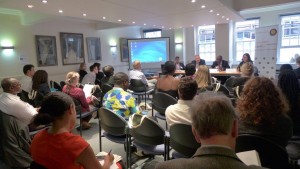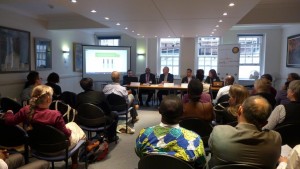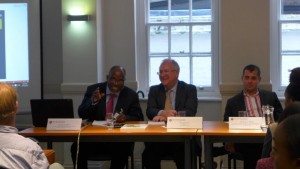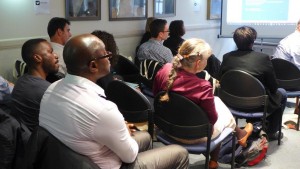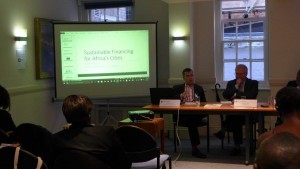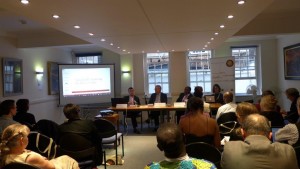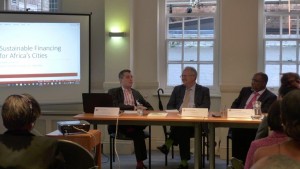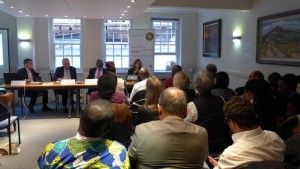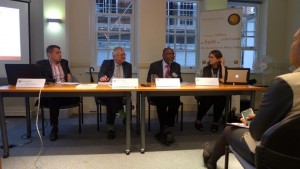Governments are being overwhelmed by the rapid growth of Africa’s cities. Strategic planning has been insufficient and the provision of basic services is worsening. Since the 1990s, widespread devolution has substantially shifted responsibility for coping with urbanisation to local authorities, yet municipal governments across Africa receive a paltry share of national income with which to discharge their responsibilities.
Responsible city authorities are examining how to improve revenue generation and diversify their sources of finance. Following the creation of a sustainable development goal for cities (SDG 11), and ahead of the Habitat III summit in October 2016, ARI invited three speakers to draw upon their experiences on financing options and the urgent need for a proactive approach on the part of national and municipal governments. It coincides with the publication of a new ARI briefing note Dakar’s municipal bond issue: A tale of two cities.
Professor Susan Parnell, Department of Environmental and Geographical Sciences, University of Cape Town, and the African Centre for Cities (event podcast 07.13 – 25.45)
- We are all interested in Africa, in cities and in financing. But the community of urban scholars and practitioners is not well defined. People do not always agree on the way cities should be studied, or what is important, and do not approach the issue of financing and Africa’s cities from the same direction.
- The availability of finance is subject to global ideas and capital flows, but is also shaped and captured by local politics and administrative systems. Understanding how this interaction plays out in the case of African urban finance is made much more complex by the fact that while money flows it also gets “fixed” very quickly in a particular type of investment; by the nature of the built environment, for quite some time. There are real conflicts internally in fiscal systems, but many other factors are also shaping urban financing.
- We are in a moment of fundamental change. The discussion about scaling up financing to Africa’s cities has been catalysed by a wider global discussion about sustainable development and cities. The sustainable development goals (SDGs) and discussion about the post-2030 development environment have played a part. So too have a number of major multilateral agreements – the Paris Agreement on climate change is one, the Sendai Framework for Disaster Risk Reduction is another. There has been a global realignment of thinking about what we want, with ramifications for where money will potentially go and shifts in the value system with regard to humanitarian aid, health and biodiversity. These changes are as important as the technical process of capital allocation. The normative base has changed in an attempt to do things differently.
- One of the things that has emerged is that the importance of the sub-national is being emphasised, as well as universality: cities across the world will determine how well we do with the SDGs.
- A number of other important shifts are emerging. For example, Africa has pushed hard to promote in these multilateral agreements a focus on territorial systems and development, not just individual cities. There is also greater emphasis on professionalisation of delivery of sustainable development, whereas previously the emphasis was more on grassroots organisations and participation. The two needn’t be in competition, but the shift has important ramifications for financing and there may be some “push-back”. In this context we are also seeing an increasing aspiration for evidence-based interventions, including in financing.
- Implicit in the shift described is the strong argument that cities are the future; and that Africa’s cities, along with Asia’s cities, are the critical sites of intervention. Africa is not being treated as a blank slate exactly, but the continent offers the potential for rolling out a whole raft of innovative and radical practices. Plenty of innovation is already taking place, of course, but there is a sense that African cities offers the most scope for improvement and transformation. This is the context for discussing the financing of cities, and the way this financing is done will be critically important.
- A word of caution. At the risk of being rude, finance people have no clue about the constraints they are about to encounter when they begin to engage with African cities and the interplay between all sorts of things – planning, law, finance, the building of administrative capacity, corruption etc. The enormous complexity is poorly understood and there is limited time in which to understand it better.
Dr Beacon Mbiba, Senior Lecturer, Urban Policy and International Development, Oxford Brookes University (event podcast 26.00 – 48.15)
- It is important to be aware of the history of the social and political dimensions that are barriers to the mobilisation of financial resources in cities.
- A lot has changed in Africa since Habitat II in 1996. The continent is politically more stable, governments are more confident and assertive on the back of economic growth and are determined to dictate what happens rather than be dictated to. Africa now has a coherent strategy – the African Union’s Agenda 2063.
- It appears that the people, civil society and local groups, who were predominant in 1996, have become more marginalised. Governments are now to the fore in formulating the input to Habitat III. There are positives and negatives to this.
- The main challenges in Africa are very rapid urban population growth (although it must be acknowledged that rural population growth is also rapid); and a chronic infrastructure shortage with regards to transport, energy, water and sanitation. Although proper sanitation is accessible by many more people now than a decade ago 2005, the proportion of people with access has not improved. It is a similar story with access to water. Of course there is much diversity between countries and cities: Accra is not Takoradi and it is not Addis Ababa. The countries with higher economic growth have been able to spend more on urban infrastructure.
- The quality of local government will be critical to the sustainability of urban development. We need to have better planning, the political will to manage local finances and resources, and an improvement in local-central relations. Strong, accountable, democratic, participatory local governance is necessary.
- This imperative raises important questions about resources. At present, finance raised by local governments in Africa is paltry by comparison with elsewhere. Most funding comes from central government but often it doesn’t pay; as for urban authorities, they often don’t even collect revenues that are due to them. We need to better manage what we have. At least 30% of local government revenue should be self-generated. Ideally, financing should come from land tax or rates, but in most cases land is poorly managed. Urban authorities and elites are the biggest culprits when it comes to non-payment for services.
- Since Habitat II, new sources of finance have emerged. One of the most significant – China – isn’t “new” at all. It’s an old partner of Africa. Remember the TAZARA railway. It is now financing many urban projects which traditional western sources of finance wouldn’t touch with a bargepole, such as the Addis Ababa light railway. Such projects can have a major impact on mobility, social inclusion, densification and increased productivity and economic diversification. A journey across Addis which a few years ago took me 2 hours now takes 35 minutes on the light railway. For the poor, especially, this is a significant improvement, although we must bear in mind that cost recovery systems and debts incurred by city authorities often place a greater burden on the poor than the better off.
- There is a need for a new social compact between central and local governments. Since 1996, decentralisation laws have been passed in most countries in Africa, yet this has not been pursued in earnest. Political tension between the centre and the local remains high. Most capital cities are controlled by the opposition. This frustrates constructive, sustainable development.
- Experimentation by the World Bank and others to see what might make local governments perform better has yielded many positive results. Introducing performance based incentives can work. For example, if you raise more tax locally/ share audited accounts (crucial for project management) with citizens/ introduce more participation in local government decision-making, you will receive a new tranche of funding. We need to ensure that such improvements in governance become sustainable and are not simply abandoned at the end of a programme. Citizen participation and better central-local relations are crucial to sustainability.
- Financing should not be seen in isolation. It is intimately connected to the political and social dimensions of urban management and development. So too is the important issue of physical planning.
- Informality predominates in African cities. Some big businesses even operate informally. Some city administration operate informally and outside the law. This phenomenon will continue to effect the entire political economy in Africa. At the same time, Africa has resources which it is not tapping effectively. More of what is lost needs to be captured.
Jeremy Gorelick, lead technical adviser, Dakar Municipal Finance Program; lecturer, Johns Hopkins University (event podcast 49.00 – 73.10)
- While it is true that the financial sector is ill-prepared for conditions in Africa, it is equally true that city leadership is ill prepared for financiers. It is alarming how many cities think they can launch a municipal bond issue without actually having established a credit history. There are many steps to go through before borrowing commercially from external investors. City leaders are often not prepared to take the time to do the work on structuring and planning projects or assessing appropriate financing packages.
- Municipal bonds are attracting a good deal of attention in African capitals, but more traditional sources of funding should not be overlooked: taxes, concessional grants from central government or international donors, user charges for services, and property income.
- In many cities, potential investors are confronted by deterrent factors including: high levels of indebtedness; an unwillingness or inability to demonstrate how loans will be repaid; a weak institutional framework, notably when responsibilities have been transferred through devolution without a concomitant transfer of necessary skills to carry them out; weak project management skills and feasibility assessments for the ongoing maintenance and management costs of a project; and shallow domestic or regional financial markets for listing new securities.
- Additionally, potential financiers have to consider the enabling environment in a country. Is central government genuinely supportive of local government? Will a mayor or administration’s commitment to a project survive a change in city leadership? Does the city has a credible master plan? Does the project serve its purported purpose – do the users actually care about it? These are all important questions which will routinely be asked.
- Dakar’s finances in 2011 were not bleak, but neither was the outlook promising. The cost of the planned investment budget exceeded available revenue and this deficit was set to widen. But Dakar showed what can be done. It had a record of creditworthiness, having repaid some concessional project loans. The leadership was committed to public participation in the planning of the proposed project, a new market in downtown Dakar that would offer subsidised rents to street traders. The proposed investment project was revenue generating. As a result, the city secured a reasonable rating from an external ratings agency and a credit guarantee for 50% of the principal amount of the loan from USAID. However, Dakar’s experience was also instructive in another, less positive respect: the central government’s refusal, for political reasons, to allow the bond issue to go ahead highlighted a tension that exists in many countries in Africa.
- If central governments are not more supportive of local governments and remain unwilling or afraid to decentralise in the way they have said they will, the sustainable provision of external financing for Africa’s cities will be very problematic.
Podcast
Photos







